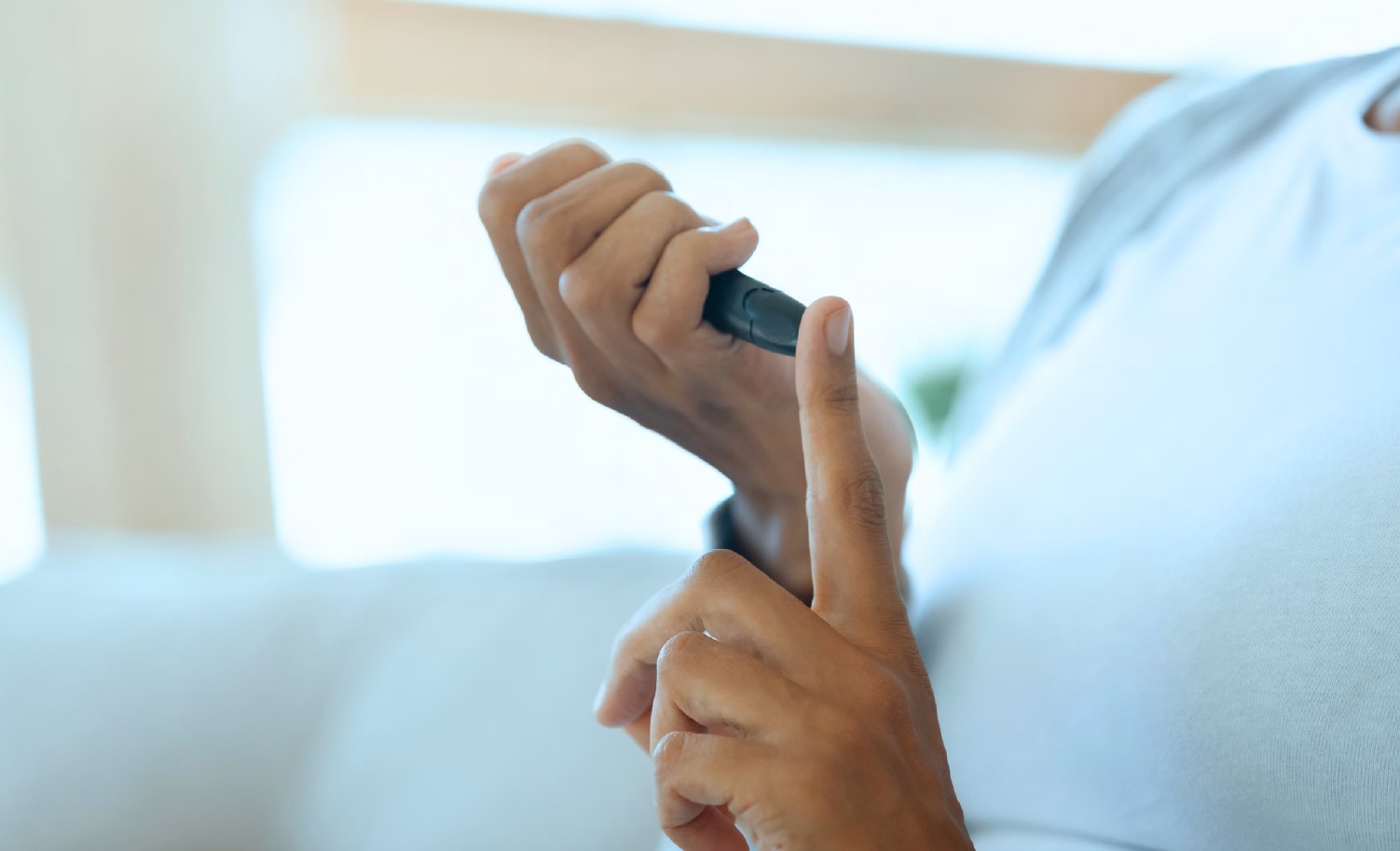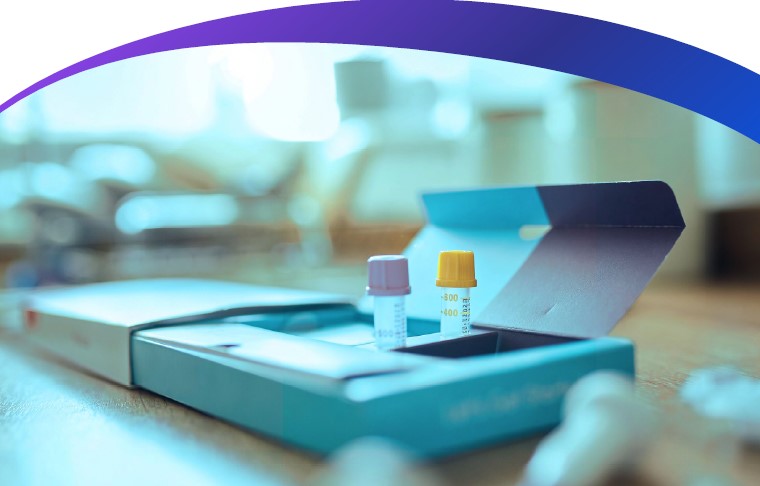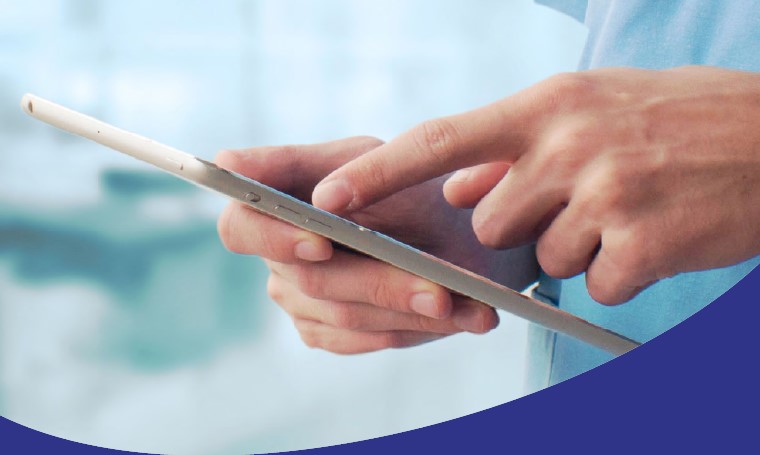Personal Health Responsibility
How it can affect Saudi Arabia’s future
Across a number of diseases, early detection and diagnosis can both save lives and reduce healthcare costs.
Multiple studies have shown that costs savings come from multiple areas ranging from lower admissions to fewer prescribed medications1,2
. One study found that treatment for cancer patients who were diagnosed early was two to four times less expensive compared to treating those diagnosed at more advanced stages.3
Encouraging the citizens and residents of Saudi Arabia to learn about disease symptoms, employ at-home self-examinations and use technology to monitor and manage their health is a key part of improving health outcomes across the Kingdom. While disease diagnosis must be done by licensed medical professionals, early detection of disease symptoms and disease management can help all individuals seek medical intervention earlier and live healthier, longer lives while reducing the economic burden of poor health for the government.
The power of knowledge and at-home self-examinations for disease awareness
Knowing the symptoms of a disease can empower individuals to seek healthcare services, which can lead to overall better health outcomes. Studies have shown that awareness of symptoms, self-examinations and at-home testing kits are powerful tools when aiming to reduce disease-related deaths.
In the Kingdom, there is an opportunity to educate the citizens and residents about these early symptoms, so each individual can take greater responsibility and control of their health.
Awareness of stroke symptoms is associated with a better overall disease prognosis. However, current knowledge of symptoms — such as common early signs like facial and hemibody weakness — is lower than desired in many populations in Saudi Arabia.4 One study from Saudi Arabia found that 56% of patients attending an emergency department showed up more than 4.5 hours after the onset of a stroke. Key factors that led to delaying emergency department visits included not knowing they were experiencing a stroke.5
Given approximately 1.9 million brain cells die each minute from the onset of a stroke, every second is critical.6 For example, stroke medications – such as thrombolytic medicines like tissue plasminogen activator (tPA) – can be more effective at reversing damage and improving outcomes the earlier they are administered.

To address the issue of delayed hospital visits, awareness campaigns for the signs and symptoms of strokes as well as the implementation of education materials in public spaces would help to increase public knowledge and likely reduce the number of deaths from strokes.7
Similarly, for breast cancer, there is a 100% five-year survival rate at stage one in almost all cases where it is detected early. With one in eight women getting breast cancer, at-home self-examinations are key to early detection and survival rates.8
In the Kingdom, breast cancer is often identified at advanced stages and more frequently in young premenopausal women. Unfortunately, Saudi women generally have poor knowledge of breast cancer, report negative attitudes towards self-examinations and do not regularly practice self-examinations.9
Working women and those with a family history of breast cancer were more likely to perform self-exams. Interestingly, the health belief model — which suggests that an individual’s belief in a personal threat of an illness or disease predicts the likelihood of behavior adoption — was shown as a valid tool to predic self-examination practice among Saudi women.10
Another disease that can be detected early with self-examinations is skin cancer. Again, awareness of skin cancer symptoms is low among some populations in the Kingdom. Specifically, studies have found that those living in the Western parts of Saudi Arabia lack adequate knowledge regarding skin cancers and practice self-examinations less regularly.11
To improve health outcomes, additional efforts should be made to improve the population’s understanding of self-exams for skin cancer and safe sun practices, such as the proper use of sunscreen, wearing clothing with tightly woven fabric and to shade from the sun when possible.12
Self-examinations are not the only way for individuals to take greater responsibility for their health. At-home testing kits are becoming more accessible and can help with disease awareness, diagnosis and management. For example, there are at-home tests for fertility, thyroid health, metabolism, colorectal cancer, and others.13,14</.sup>

Technology can support at-home examinations
Technology is making it easier than ever before for individuals to take an active role in identifying their disease symptoms or performing at-home examinations. Consider the powerful impact technology-enabled symptom checking tools has provided for individuals wondering if they need a COVID-19 test.15
Devices such as blood pressure or glucose monitors help people monitor a specific health indicator so they know when to manage their condition or seek professional medical support.16 Mobile technology, including mobile apps, can be an effective tool to facilitate the changing of unhealthy lifestyle behaviors within the Saudi community. The popular Sehhaty app has a suite of integrated services that enables users to access health information and medical e-services provided by different health organizations in the Kingdom.
Along with the 937-healthcare number and the Seha and Mawid apps, these tools allow users to receive medical consultation from accredited specialists when needed, such as in the case of an at-home examination.17

Apps can also be a valuable tool for weight management, which is a concern in the Kingdom as obesity rates are rising.18 Studies from Saudi Arabia have shown apps can be effective in helping overweight or obese respondents lose weight by tracking caloric intake, calorie burn and weight.19
Overweight or obese users were most interested in apps that offered the possibility to be monitored by a specialist and a barcode scanner to help identify calorie content in foods. This suggests there is interest from individuals to take greater control of their own health. More advanced technology has been explored to improve disease management for people with diabetes.
For example, a study using an intelligent mobile diabetes management system (SAED) found that mobile technology can significantly improve the HbA1C levels among Saudi diabetics and improve their disease management plans.20 The SAED system was shown to be an effective and low-cost solution for increasing the quality of life of diabetic patients in the Kingdom, which is important given the high level of cases and rising economic burden of this disease.21
Promoting a culture of wellness in Saudi Arabia
Nurturing a culture of health and wellness is critical to supporting the long-term health of the citizens and residents of the Kingdom. Saudis are more likely to seek out healthcare only once they have become sick, which increases risks and costs in the face of rising disease epidemics.
Additionally, studies have shown men typically ignore a set of symptoms — such as enlarged lymph nodes, problems swallowing, white patches in the mouth and more — that can be indicators of serious health issues, like cancer.22 Public health awareness campaigns should encourage all citizens and residents to pay attention to these symptoms and speak to their doctor to rule out or catch serious health problems early.
A culture of personal health and wellness will help achieve some of the Vision 2030 healthcare goals, such as containing healthcare costs. Investments in educating the citizens and residents about disease symptoms and at-home examinations could potentially have a significant impact on the health and wellness of each individual.23 To have a healthier tomorrow, each person must take greater personal responsibility for his health management today.
References
1 https://pubmed.ncbi.nlm.nih.gov/15587433/
2 https://www.researchgate.net/publication/45406528_Cost-Effectiveness_of_Interventions_to_Prevent_and_Control_Diabetes_Mellitus_A_Systematic_Review
3 https://www.un.org/sustainabledevelopment/blog/2017/02/who-early-cancer-diagnosis-better-trained-medics-can-save-lives-money/
4 https://www.researchgate.net/publication/345319621_Stroke_Awareness_Among_University_Students_in_Saudi_Arabia
5 https://journals.sagepub.com/doi/pdf/10.1177/2050312118776719
6 https://www.healthpartners.com/blog/every-minute-counts-after-a-stroke/
7 https://www.researchgate.net/publication/345319621_Stroke_Awareness_Among_University_Students_in_Saudi_Arabia
8 https://emirateswoman.com/princess-reema-saudi-arabia-shines-light-breast-cancer-awareness/
9 https://bmcpublichealth.biomedcentral.com/articles/10.1186/s12889-015-2510-y
10 https://bmcpublichealth.biomedcentral.com/articles/10.1186/s12889-015-2510-y
11 https://www.bibliomed.org/?mno=79003
12 https://www.cdc.gov/cancer/skin/basic_info/sun-safety.htm
14 https://www.nytimes.com/2021/01/11/health/colonoscopy-health-home-testing.html
15 https://www.cdc.gov/coronavirus/2019-ncov/symptoms-testing/coronavirus-self-checker.html
17 https://www.arabnews.jp/en/saudi-arabia/article_27324/
18 https://www.ncbi.nlm.nih.gov/pmc/articles/PMC7999834/
19 https://www.ncbi.nlm.nih.gov/pmc/articles/PMC6406230/
20 https://mhealth.amegroups.com/article/view/11434/11952
21 https://mhealth.amegroups.com/article/view/11434/11952
22 https://www.medicinenet.com/10_cancer_symptoms_that_men_ignore/views.htm
23 https://www.sciencedirect.com/science/article/pii/S2213422018301690#bib0280


